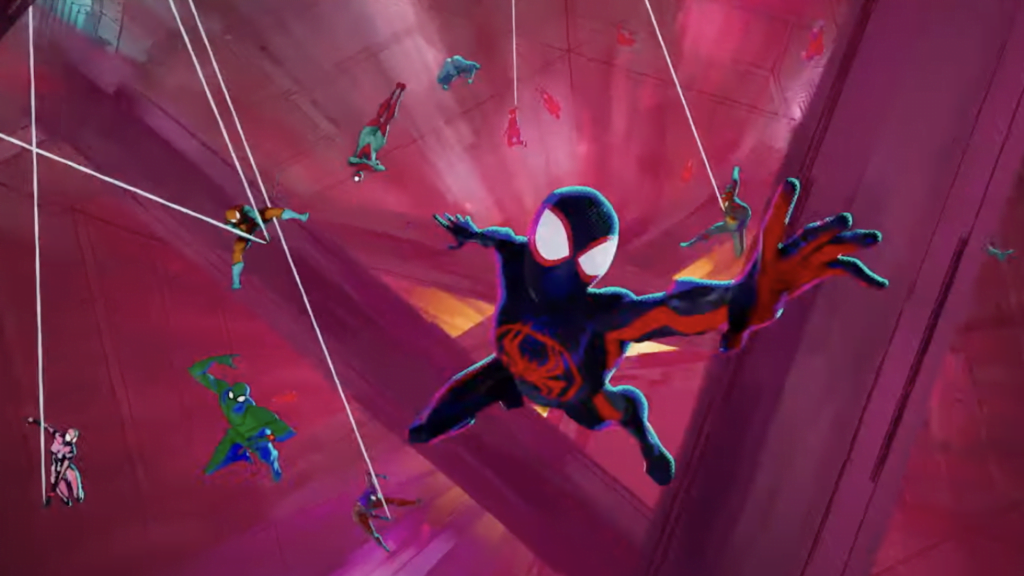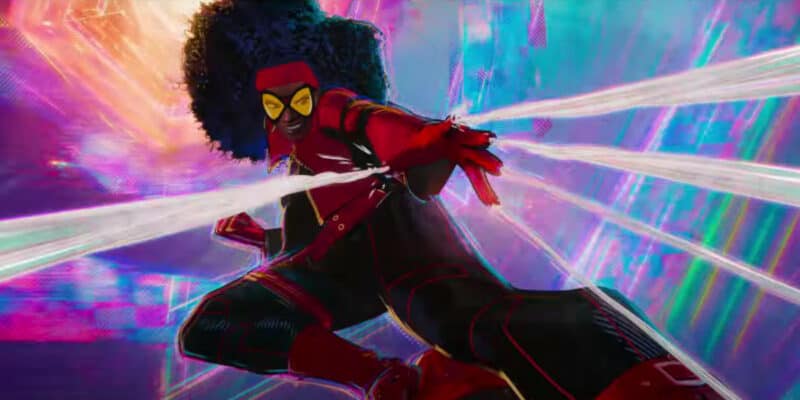At present, Spider-Man: Across the Spider-Verse is taking over the world by a storm, boasting both record-breaking box-office returns and critical acclaim that’s putting it in the company of the greatest superhero movie and the greatest animated movies of all time. The movie follows up on the Oscar-winning 2018’s Spider-Man: Into the Spiderverse, which also heavily featured the theme of identity and the crisis that comes with it. That in itself has been an allegory to queer narratives in all superhero media, particularly the X-Men, which was often compared to the civil rights movement.
Ever since Sam Raimi released Spiderman in 2002, it has evolved into a bankable franchise as the friendly neighbourhood Spider-Man has been one of the most beloved characters of all time. It also helps that it has been played by charismatic actors like Tom Holland to Andrew Garfield. In all the movies, Gwen has been primarily a side character even as a love interest, and largely a damsel in distress. Across the Spider-Verse changes that and in certainly bigger than expected ways. While there’s a much-anticipated spin-off movie for Gwen coming along the way, one particular aspect is if the movie is substantiated or warranted as animated movies which are the likes of any of the Spider-Verse movies cost a lot of time and money.
Other than Gwen, Aunt May has served as a moral and motherly figure to Spider-Man whose fate has also been rather gloomy. And of course, 2018’s Into the Spider-Verse did give a major glow-up to the titular character, turning her into a kick-ass ally who’s wholly capable of fighting alongside our favourite superheroes. She was also the one providing the characters with spider gear, which makes it even more awesome.
Other than Gwen, Aunt May has served as a moral and motherly figure to Spider-Man whose fate has also been rather gloomy. And of course, 2018’s Into the Spider-Verse did give a major glow-up to the titular character, turning her into a kick-ass ally who’s wholly capable of fighting alongside our favourite superheroes. She was also the one providing the characters with spider gear, which makes it even more awesome. Additionally, Rio Morales serves as Miles‘ mother in Across the Spider-Verse which is much different from the usual stereotypical roles. It makes sense that a movie which already set such precedents is going in amazing places with the character of Gwen.

There are other details as well – Issa Rae’s Jessica Drew (Spider-Woman) drives a bike while pregnant, Spider-Man carries around his baby while on the mission (dangerous but fun), and Gwen is also able to bring the team we first met in Into The Spider-Verse among so many little and easy to miss details, particularly during Miles escape from Spider Society.
Gwen’s Story: From ‘one of the famous dead girlfriends’ to ‘Spider-Woman’
Across The Spider-Verse opens with Gwen playing the drums and narrating the story of Miles and her own. There’s also a bubbling plot around Gwen being the primary romantic interest of Miles. Prior to this, Gwen as a character has been noted for their death at the hands of a Spider-Man villain and Mary Jane has been the primary romantic interest for Peter Parker aka Spider-Man. Emma Stone’s portrayal of Gwen Stacy alongside Andrew Garfield’s Spider-Man was perhaps the most famous one, until Hailee Stienfeld got introduced as the multiversal Spider-Woman. This character draws from Spider-Gwen or Ghostspider, which was introduced as the new multiversal Spider-Woman character after Gwen was killed in the comics.
So firstly, Gwen is no more a mere romantic interest or a side character or a supporting character. She is, in fact, almost a protagonist now. Given that Across The Spider-Verse begins with Gwen talking about Miles, it’s different as her arc or place within the story is entirely independent of Miles’.
Another unique aspect of Gwen’s arc is the way the conflict between her and Miles is infused with the overall story. The sequel deals with some serious themes and it’s peculiarly visible that Gwen is in situations where she has to make so many hard decisions, and she does so bravely dealing with their consequences. What particularly strikes out here is the ability and agency of a female character to be not limited within age-old storylines. She is no more the famous dead girlfriend, she’s a superhero in her own right.
In fact, more than anything, both of their complex arcs complement each other every step of the way. It is also remarkable that while there has been a romantic subplot, an inherent conflict is what defines the tone of the relationship between Miles and Gwen, which is rare within this genre as only a few rare movies like Guardians of the Galaxy: Vol. 3 have even dared to engage with mature relationship dynamics.

Another unique aspect of Gwen’s arc is the way the conflict between her and Miles is infused with the overall story. The sequel deals with some serious themes and it’s peculiarly visible that Gwen is in situations where she has to make so many hard decisions, and she does so bravely dealing with their consequences. What particularly strikes out here is the ability and agency of a female character to be not limited within age-old storylines. She is no more the famous dead girlfriend, she’s a superhero in her own right.
Going beyond meta: Questioning the canon
One of the really exciting and kind of revolutionary ways the movies change superhero cinema is the way in which it deals with the idea of canon. Canon, simply means something is part of the multiverse of whatever universe is the movie being built upon. Canon events, then roughly define what events are necessary for a character’s arc. For instance, the death of Uncle Ben is a canon event that makes spider people, well, spider people. How this changes the way we see superhero movies is by reframing the question of who gets to be a superhero? And what does it entail? Are there any sacrifices needed?
Miles is told in the movie that he cannot save his dad because his dad’s death is a canon event, disrupting which can lead to disasters. But they don’t know that and Miles questions and fights off against it. The journey of Miles Morales has famously been attached to the idea of how superheroes are not gods. He infamously said the now iconic lines, “Anyone can wear the mask. You can wear a mask. If you didn’t know that before, I hope you do now.” From a story point of view, this allows for narratives featuring flawed people, even Gwen for that matter. Because at the end of the day, this becomes a story about people, and how that could be the story of any of us. While superhero movies have been doing their own fun with going meta (movies like Deadpool for instance), questioning the canon is really where the stakes become bigger.
A Trans allegory?
The trans allegory narrative started when fans noticed a “Save trans kids” poster in Gwen’s room in the teaser of Across the Spider-Verse. On one hand, it is a nice gesture for eagle-eyed fans, especially those who identify as queer. On the other hand, it’s merely a gesture as it doesn’t add anything worthwhile to the story. More often than not, it’s a form of subtle queer baiting where people behind the movies don’t have to make any big political statement. Other than the poster, Gwen’s hair in the movie is similar to the trans flag along with the whole colour scheme, which is one of the foremost reasons behind the narrative.

As mentioned before, Gwen’s story is centred around if her father would accept her identity as a Spider-Woman, knowing what she has been falsely involved with. And given the movie had made some big changes, the looming question if Gwen is canonically trans persisted but it’s most likely a no. The answer lies in both the movie and the unwillingness of blockbuster movies to take up such a “political” narrative. At the end, it becomes how we read her narrative. The most popular interpretation has been reading her arc as sort of a coming out story, which actually fits well. Much of Gwen’s journey is stifled by how she will come out to her dad as a Spider-Woman.
It gets only more complex from here as people have warned of using Gwen in relation to the trans identity and politics as she is, at the end of the day, a corporate-owned entity whose creator has been accused of sexual misconduct. However, even though queer-coded subtext is mostly ambiguous, especially for a movie that is PG rated; it shouldn’t limit the audience in finding different ways they connect to the story and the character.
It gets only more complex from here as people have warned of using Gwen in relation to the trans identity and politics as she is, at the end of the day, a corporate-owned entity whose creator has been accused of sexual misconduct. However, even though queer-coded subtext is mostly ambiguous, especially for a movie that is PG rated; it shouldn’t limit the audience in finding different ways they connect to the story and the character. Even this little shift as giving Gwen a “protect trans kids” poster in her room has brought much discussion to her character and arc, and how it differs from what we have usually seen.
Verdict: Spider-Man: Across The Spider-Verse is a watershed moment in both animated movies and superhero movies. It’s unlike anything we have seen so far, with so much delicate handling of characters on multiple horizons. With incredible imagery interspersed on a roller coaster ride, it has earned its place as one of the best superhero movies with nuanced characters and the careful handling of Gwen’s arc is one of the reasons behind its success.




